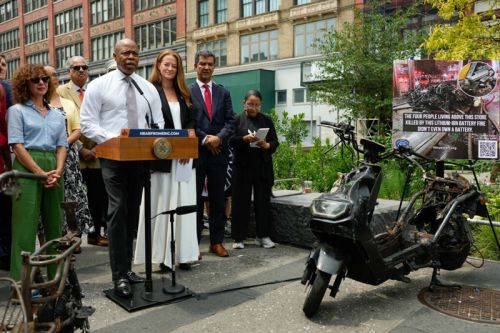NEW YORK (BRAIN) — The city's Department of Transportation has released details of its $2 million trade-in program for food delivery workers using uncertified e-bikes, other e-mobility devices, and lithium-ion batteries.
The municipal trade-in program for food delivery workers is the nation's first. Selected participants — who must live in the city, be at least 18, own an eligible working device, and have earned at least $1,500 in the past year as a food delivery worker — will receive a UL-certified e-bike and two compatible UL-certified batteries in exchange for their uncertified device and batteries. Delivery workers receive two batteries because many report that a full day requires an extra battery.
"When used correctly, e-bikes are a convenient, low-cost transportation option that reduce congestion and emissions, and tens of thousands of delivery workers rely on them every day," Mayor Eric Adams said Monday. "But too often, those bikes are powered by unsafe, uncertified batteries that at any minute could combust. That is why we are doing everything in our power to put a stop to these deadly fires and make use of safe lithium-ion batteries more affordable."
The bill proposing the program was introduced by Councilmember Keith Powers and became law last September, two days before the city required all powered mobility devices and batteries to be certified.
"It's critical that we continue to take steps to get dangerous, fire-starting lithium-ion batteries out of New York City," Powers said. "That's why I introduced the bill that became Local Law 131 of 2023 to create the first municipal battery trade-in program in the country. I am grateful that Mayor Adams' administration, the fire department, and the Department of Transportation are doing this important work to make us safer."
An online public hearing on the program will be Aug. 22 at 10 a.m.. Applications will open in early 2025.
Cutting charging station red tape
Another initiative announced by Adams to address lithium-ion battery fires that have plagued New York City in the past few years includes the DOT proposing a rule to expedite approvals for property owners to more quickly to install public e-bike battery swapping and charging cabinets on public sidewalks, which is currently prohibited.
It will enable property owners, or commercial tenants with the property owner's consent, to apply for a permit to install a battery swapping and charging cabinet in front of their business on the sidewalk. Each cabinet must comply with specific siting and dimensional requirements and undergo FDNY and Department of Buildings review and approval.
In February, the first of five public e-battery charging stations for delivery workers opened as part of the city's new six-month pilot program.
"We're cutting red tape so property owners can install charging stations outside, in front of their buildings," Adams said.
An online public hearing on the administration's battery swapping and charging cabinets rule will be Aug. 21 at 10 a.m. Applications for the program will open at the end of this year.
Awareness campaign expanded
The third initiative announced includes the Fire Department of New York launching a $1 million public education and awareness campaign on the dangers of unsafe lithium-ion batteries. New data shows 59% of last year's lithium-ion battery fires started when those batteries were not charging. This campaign will build on Adams' Charge Safe, Ride Safe: New York City's Electric Micromobility Action Plan that was signed into law last year as part of the lithium-ion battery safety legislative package.
Of the $1 million, $750,000 will be used for ads online, on subways and buses, digital kiosks, in newspapers, and on the radio. Translated into 10 languages, the ads will highlight the destructive potential of battery fires and will be placed in neighborhoods that have a high incidence of lithium-ion battery fires.
The final $250,000 will support educational materials and advanced firefighting equipment, including technology that allows firefighters to safely extinguish fires without opening lithium-ion battery packs.
Task force update
Adams provided an update on the Lithium-Ion Battery Task Force that consists of FDNY fire marshals, Bureau of Fire Prevention inspectors, and Department of Consumer and Worker Protection inspectors. It has conducted hundreds of e-bike and e-bike repair shop inspections in the city. More than 1,000 violations, 46 criminal summonses, and 16 vacate orders were issued last year.
In February, task force officials closed a Queens e-scooter business, saying the location was rebuilding lithium-ion battery packs into what it labeled "Frankenstein batteries" that violated the city fire code. Officials recovered about 60 battery packs and hundreds of lithium-ion cells. They also confiscated about 25 e-scooters and 25 combination electric and gas mopeds.
Since 2019, lithium-ion batteries have started 733 fires, killing 29 New Yorkers and injuring 442 more. In 2023, 133 fires started from lithium-ion batteries that were not charging, compared to 91 that occurred while they were charging. Through the middle of April this year, according to the FDNY, there were 61 investigations, 30 injuries, and one death.
Earlier this month, New York Gov. Kathy Hochul signed into state law a legislative package to enhance lithium-ion battery safety standards that includes recognizing EN and UL testing standards. The New York State Senate passed the legislation in late May.




